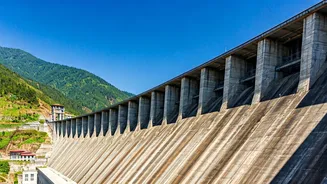Bhutan Hydro Investment
Tata Power's initiative to acquire a 40% share in a Bhutan hydro Special Purpose Vehicle (SPV) underscores a robust commitment to renewable energy. The
financial commitment of Rs 1,572 crore showcases the scale of the company's investment and its strategic vision. This investment in Bhutan’s hydropower projects highlights Tata Power’s dedication to bolstering its regional green energy footprint, thereby contributing to the promotion of sustainable energy sources. The move is aligned with global efforts to transition to cleaner energy and reduce reliance on fossil fuels. It also emphasizes the importance of regional cooperation in achieving these goals, leveraging the potential of hydropower as a clean and sustainable energy source. This strategic move can potentially increase the company's presence in the clean energy market and influence the sector's growth in the region.
Clean Energy Boost
The primary objective of Tata Power's investment in Bhutan's hydropower projects is to boost the availability of clean energy. Hydropower, a renewable source, contributes significantly to reducing carbon emissions and mitigating the adverse impacts of climate change. This investment strengthens the infrastructure necessary for clean energy generation and distribution. Furthermore, it supports the transition towards a sustainable energy model by increasing the proportion of green energy in the region's overall energy mix. By investing in hydropower, Tata Power contributes to decreasing reliance on polluting fuels, paving the way for a more environmentally friendly future. This supports India's environmental objectives while encouraging a shift towards green energy options in the broader area.
Regional Green Impact
This investment also plays a vital role in broadening Tata Power's footprint in green energy throughout the region. With this, the company gains a more extensive presence in clean energy markets, increasing the reach of its environmental goals. The initiative could foster additional collaborations and partnerships with other regional players interested in sustainable energy. This expansion also contributes to regional energy security, as the region becomes less reliant on foreign energy sources. Furthermore, the partnership could contribute to the creation of jobs and economic development in the area, offering long-term advantages that go beyond the direct benefits of clean energy production. The ripple effect of such investments can facilitate sustainable economic growth and environmental protection.
Financial Details
The financial aspects of the deal, specifically the Rs 1,572 crore investment, provide a clear indication of the commitment from Tata Power. This capital infusion demonstrates confidence in Bhutan's hydropower sector and reflects a strategic long-term vision. This investment supports the development of crucial energy infrastructure, thereby supporting the sustainable growth of the area. Additionally, such financial commitment often attracts other investors to the area, further boosting the growth of the renewable energy sector. The successful execution of the transaction indicates Tata Power’s ability to allocate capital effectively to support its strategic vision in the energy sector and make a sizable contribution to the area's financial stability.
Sustainable Future
Ultimately, the purchase of a stake in the Bhutan hydropower SPV by Tata Power is a move to build a more sustainable future. This initiative supports environmental sustainability and fosters economic progress in the region. By supporting clean energy sources, the company contributes to a cleaner environment, better public health, and long-term economic benefits. These kinds of partnerships are essential for developing a more resilient and environmentally friendly energy system. The initiative is a model for other organizations and countries to collaborate on sustainable development projects, and it supports global efforts to combat climate change. Tata Power's activities pave the way for a more sustainable future for India and its neighbors by investing in renewable energy.





















